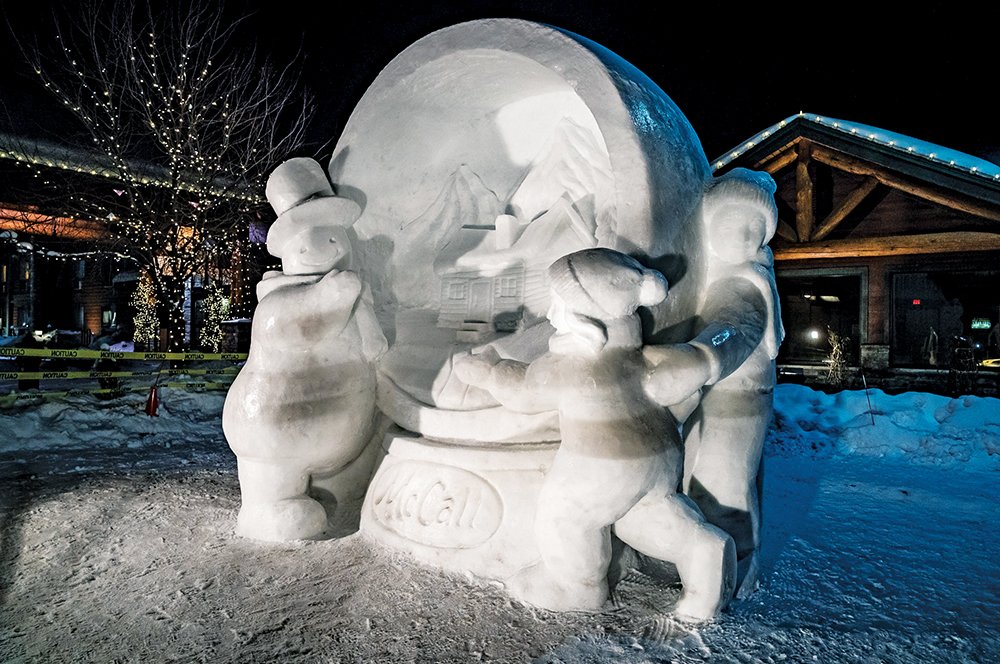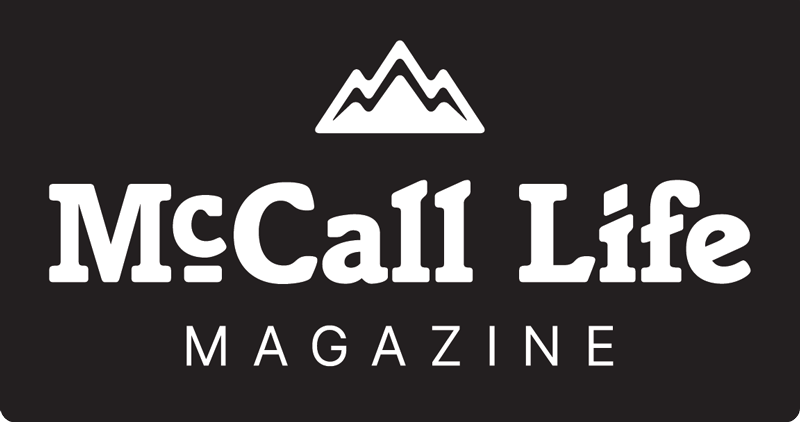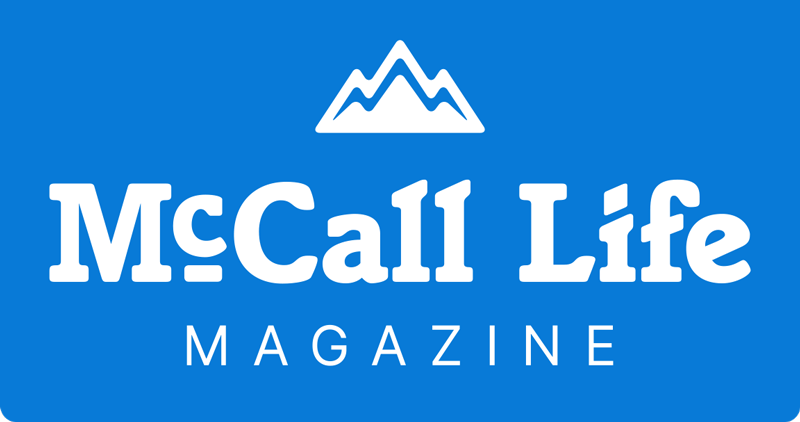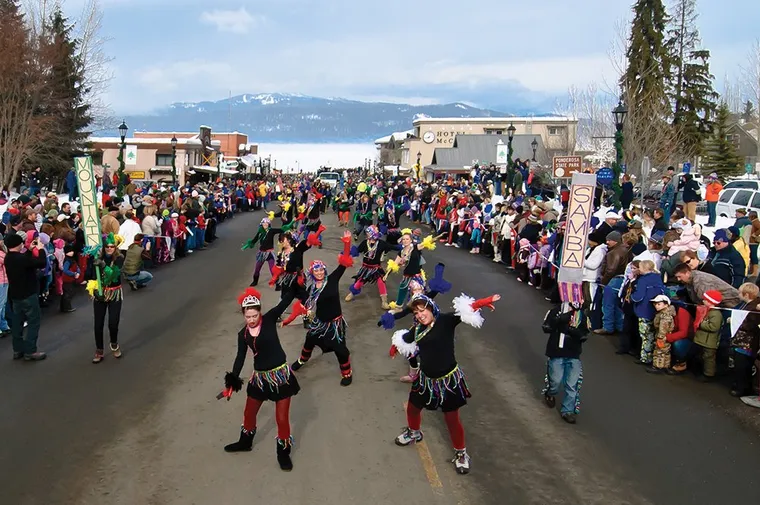One of the biggest challenges for a successful business owner is a test of restraint—when everything is trending upward, it takes an exceptional amount of insight to step on the brakes and downsize.
It seems counterintuitive, but ultimately, the business owners at the McCall Area Chamber of Commerce decided to show restraint as the McCall Winter Carnival enters its 59th year.
The 2024 Winter Carnival will be condensed to one weekend and pushed later to Feb. 23, 24, and 25. McCall will still host all the classic Winter Carnival attractions, from the Mardi Gras parade to the snow sculpture tours, but in a shorter timeframe.
The carnival theme is “Color Outside the Lines” as a tribute to creativity and community. It will focus on honoring the area’s educators and their steadfast presence and commitment to excellence in the communities that make up the West Central Mountain region.
“We’re inviting educators from Cascade to Council—and everywhere in between—to serve as the Grand Marshals of the signature Mardi Gras Parade,” says McCall Area Chamber of Commerce Executive Director, Julie Whitescarver. “Our local schools have been a source of consistency and inspiration for many years, and we want to celebrate the role they play in building future leaders and innovators as our community undergoes unprecedented growth and change.”


The decision didn’t come lightly—the chamber team examined a variety of data and talked extensively with local business owners before they announced this change in 2022. This meticulous process ensured the chamber made the best decision possible for its community which has largely praised the decision.
“We are extremely pleased the chamber is listening to the businesses of McCall concerning Winter Carnival,” says Cosette Martineau, co-owner of My Father’s Place restaurant, in a press release. “We support the changes that they are making. We are looking forward to the new traditions to be made.”
The general consensus was that the Winter Carnival had grown beyond the community’s capacity to support it.
The chamber has been hosting the carnival as it exists today since 1965 when the community rallied to host a festival that would promote the area’s pristine skiing. This culminated in the inaugural carnival which included a two-day event with slalom races, cross-country ski events, ski jumps, and snowshoe and snowcat races. The annual event has exploded in popularity since then. In recent years, the town of 3,844 bands together to host more than 60,000 visitors over 10 days.
“Because the crowds have swelled to such unmanageable numbers, many business owners, including myself have expressed concern over whether Winter Carnival has outlived its usefulness,” says Cori Rice, owner of the Christmas Shop and Silver Linings, in a press release. “Additionally, with staffing shortages that all businesses are experiencing, recruiting staff to commit to a 10-day stretch of chaos has been problematic, if not impossible.”


Causes For Change
The decision to shorten the Winter Carnival came after the chamber used the city of McCall’s lodging tax revenues to assess visitation trends. The data showed a 201.5-percent increase in January and February in visitors between 2012 and 2022.
Additionally, the chamber reported that January and February occupancy in McCall rose by 22.66 percent from 2020 to 2021 when the Carnival was canceled for the first time.
“An unintended experiment took place during the COVID era, when Carnival was canceled for health and safety reasons,” says McKenzie Kramer, marketing manager for the McCall Chamber. “We surveyed business owners and found that 80 percent of them saw no drop in business or an increase in business the year Carnival was canceled. That gave us the confidence to make this needed adjustment so that our hospitality industry can more realistically give those who visit McCall the friendly, high-quality experience they’ve come to expect and treasure.”
When the Carnival was launched back in 1964, McCall was a sleepy town with a new ski area on Brundage Mountain that was looking to draw attention and visitation during what was, back then, the slow part of winter. The first Carnival was a single-weekend event held in late February that focused on outdoor winter sports. Over the next six decades, the format and timing of the event would change and evolve to meet the community’s needs. It was in the mid-1990s that the event began to span two weekends and settle into its current spot on the calendar, starting the last weekend in January and ending the first weekend in February.
Today, with the county facing a housing shortage and businesses facing ongoing staffing challenges, the modern carnival setup no longer meets the business community’s needs. Several cornerstone downtown businesses have felt the need to shut their doors entirely during the carnival on two peak winter weekends that would otherwise be profitable and manageable.
“For the last couple of years, as a business, we decided to close down during Winter Carnival,” Martineau says. “We did not have the staffing to adequately service the influx of people.”
A chamber survey of McCall area businesses conducted at the end of the 2021 Winter season showed 82.5 percent of businesses reported that canceling the carnival had no negative impact on their business. Additionally, 80 percent reported winter business has increased during the winter when there was no Winter Carnival, and 70 percent of businesses supported either shortening the carnival to one weekend or moving it later in the winter—30 percent voted for no change.
“Having a year with no Carnival gave us tremendous insights into the role Carnival plays in our winter economy,” Kraemer says. “It became clear that while carnival is, for some, a treasured tradition, our local winter economy no longer relies on it, and it may actually be a detriment to our local businesses to have it occupy two weekends during the peak of snow season.”
While many members have expressed support in moving the carnival to March, the chamber felt moving it to the end of February was a good place to start to ensure the construction and maintenance of snow sculptures.
“As a hotelier and downtown business owner, I think this is a good solution,” says David Carey, who co-owns Hotel McCall, Rupert’s Restaurant, and Foresters Club. “I am confident that skiers and snowmobilers will fill our beds, tables, and bar seats during peak season. As a community member, I’m happy to see that the events and traditions people love most will continue, just later in the winter.”
Organizers of other community events will have the option of scheduling them during carnival or establishing them during other time periods when lodging and other services are more available.
Jerry Wortley is one of the organizers of the Idaho Sled Dog Challenge. That event will continue to be held the last week in January and the first week in February. Wortley says not competing with Winter Carnival will give his event room to grow.
“We host a week-long event, and now, if people come up to the race there might be hotels available that were all filled up during Winter Carnival,” he says.
Overall, the chamber is confident these changes will spread out the crowds across more weekends so that hoteliers, restaurateurs, and shopkeepers can more realistically serve the people who visit. As the carnival continues to adapt to the community’s needs, the folks at the chamber are working to ensure the spirit of the carnival is not lost.
“Winter Carnival began as a tool to bring visitors to our area when they would not otherwise be here,” Rice says. “Outdoor recreationalists are already here in January and February, and many snowmobilers, skiers, and winter sports enthusiasts I’ve talked with over the years have expressed discontent with Winter Carnival being held during peak snow conditions. All businesses will benefit from smaller influxes of visitors throughout winter rather than an overwhelming volume that stresses the locals to the point of sheer exhaustion.”



